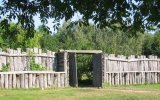Genesis 14 is also very interesting. Four "kings" attacked five "kings". The four defeated the five, and carried away Lot and many goods. So Abram took 318 servants, attacked all four kings, defeated them, and rescued Lot and all the goods. Four kings defeated by an army of 319 people.
Why so many kings? Every town had a "king". They were really tribal chiefs / town mayors. (In this case, all were kings of individual towns, except for Tidal, who seems to have been king of a larger area, see v9).
And assuming their combined army was about 300 men also (assuming it was a fair fight - Abram might have beaten a larger force, or maybe outnumbered them, we have no idea, let's guess 300), then on average each king had 75 fighting men. If half the men in their town were of fighting age, that would mean each king had about 150 men or 300 total subjects. Assuming half lived in the town itself and half were farmers living in the surrounding countryside, that means 150 total residents per "city" including women. On average, so some would have been even smaller.
That's incredibly crude maths, it relies on so many assumptions it's going to be wrong, but it paints enough of a picture to show that each "king" was probably only ruling a few hundred people, maybe a thousand or two tops, with only a fraction of those actually living in his city. Which gives us a very rough idea of the size of a "city" at the time.
Why so many kings? Every town had a "king". They were really tribal chiefs / town mayors. (In this case, all were kings of individual towns, except for Tidal, who seems to have been king of a larger area, see v9).
And assuming their combined army was about 300 men also (assuming it was a fair fight - Abram might have beaten a larger force, or maybe outnumbered them, we have no idea, let's guess 300), then on average each king had 75 fighting men. If half the men in their town were of fighting age, that would mean each king had about 150 men or 300 total subjects. Assuming half lived in the town itself and half were farmers living in the surrounding countryside, that means 150 total residents per "city" including women. On average, so some would have been even smaller.
That's incredibly crude maths, it relies on so many assumptions it's going to be wrong, but it paints enough of a picture to show that each "king" was probably only ruling a few hundred people, maybe a thousand or two tops, with only a fraction of those actually living in his city. Which gives us a very rough idea of the size of a "city" at the time.
Last edited:

